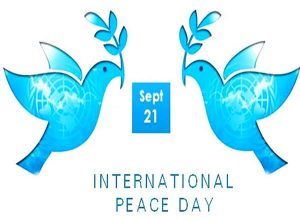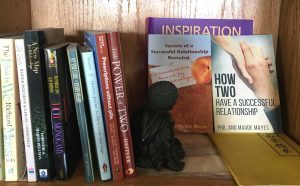Maude Mayes's Blog: Secrets of a Successful Relationship Revealed, page 73
October 24, 2018
Successful Relationships Reading Corner
In this week’s blog, we asked if you have thumbtacks in your relationship, where thumbtacks represent the lack of total acceptance. Here are some articles discussing different aspects of this issue.
Be the Change You Wish to See in Your Relationship “If you want your partner to change, start by accepting them for who they are. In The Seven Principles for Making Marriage Work, Dr. John Gottman says, “People can change only if they feel that they are basically liked and accepted the way they are. When people feel criticized, disliked, and unappreciated they are unable to change. Instead, they feel under siege and dig in to protect themselves.””
How to Communicate Your Needs in a Relationship “As we’ve discussed before, many men these days have trouble being assertive. One of the things these “Nice Guys” struggle with is communicating their needs to others. Because they shy away from conflict, and don’t want to trouble or inconvenience others, they constantly let other people’s needs supersede their own, and they find it difficult to articulate their personal goals and desires. Instead, they rely on “mind-reading,” believing their partners should intuitively know what they need without them having to say anything.”
8 Ways to Practice Compassion for a Healthier and Stronger Relationship “Let’s consider basic human needs, as taught by psychologist Abraham Maslow. All of our behaviors are driven by our needs, and our needs are derived from our emotional states. After our needs of food and shelter have been met, each of us have very important basic needs—four of which are the need for attention, affection, appreciation, and acceptance. The ways in which we seek these things is dependent upon our level of emotional intelligence, our beliefs, and our core values.”
October 21, 2018
Do You Have Thumbtacks in Your Relationship?
 Thumbtacks. It’s a metaphor about total acceptance that works so well that we used it in both our books, and we’ve found that it resonates well with others, too.
Thumbtacks. It’s a metaphor about total acceptance that works so well that we used it in both our books, and we’ve found that it resonates well with others, too.
Picture yourself barefoot, leaping and prancing around on a dance floor. You feel totally free to be completely yourself. You can express yourself however you want. Now imagine one thumbtack being introduced. (Drawing pins to our English readers!) You don’t know where it is on the floor or when you will encounter it. You can no longer let the muse of dance take wing. You never know when you will come down upon that one thumbtack; every step is a risk.
Thumbtacks represent, of course, lack of total acceptance from your partner. They’re criticisms, irritations, demands; they all want you to act differently in some way. Your partner doesn’t accept you as you are. But when there are no thumbtacks, when your partner offers what we call 100% acceptance, the effect is transforming. You can be yourself.
The importance of 100% cannot be underestimated; it is nothing like 99% because anything less involves measurement, division, in and out, good and bad. It enables total freedom from the need to withdraw and to defend, and consequently to separate. The extraordinary freedom to be yourself that comes from this kind of acceptance can only be achieved by 100%.
The freedom is liberating. Just as with the dancing, there is no comparison; 99% acceptance and 100% acceptance are not different by 1%. They differ in quality in the way that two parallel lines differ from two non-parallel lines.
Do You Have Thumbtacks in Your Relationship? #relationships #marriage #relationshipadvice
Click To Tweet
If there is some small corner within your partner that is still holding back acceptance, you never know when it might rear its head and bite you, so you must still always be guarded to some degree or another. The more thumbtacks you encounter, the less open and sharing you will become. But when each partner is assured of complete acceptance, it is transforming and wonderfully liberating; by being completely ourselves, we are that much more real, authentic and trustworthy to the other.
Once you reach the threshold of 100%, your mind is not busy with whether the person is right or wrong, or needs changing or adjusting. Instead, when you accept yourself and the other and go forward in the freedom that this way of being brings, it creates an exquisite experience of peace and joy.
This is not to say that people should tolerate anything and everything, acting like a doormat and letting their partner walk all over them. Instead, it is only possible in a partnership that has core agreements in place. They vary from couple to couple, but examples would be trust, honesty, fidelity and fiscal approach. When your values are in agreement, nothing else is necessary. You can give your partner the space to do and be anything.
Lack of projections and demands is critical to being in this place together. Many people have their heads filled with everything they think they need to make things work, in any situation and in every relationship. They have so many things decided in advance – what they need in common and how things have to look and feel – that there is very little room for anything to actually just be, let alone the coming into being of something new.
When you have shared meanings and values as your basis for agreement and union, then you can let go of determining the specifics. You can enjoy the experience of another person, one who is totally unique, and celebrate the difference. You can be constantly enriched by the other. You will be able to reside in the present, experiencing what is, without preconceptions.
Of course, to do this, you have to accept what is offered. After a lifetime of thumbtacks, being yourself in a relationship may be unfamiliar. For years, Phil would deflect compliments with “No, I made it too salty,” or “Oh, it’s only a thrift-store hat.” Now, he usually manages to just say, “Thank you.” It can be hard for many people to own themselves.
The other side of this is that you must offer your partner the same; you must accept them totally, and that is where the work is. They’re different. They do things differently and think differently, and so what? It’s none of your beeswax. If you don’t try to fit the other into an idea or a mold or a picture of what should or could be, you can experience what is. Remember that words have power and can be as sharp as tacks. Learn to listen to yourself and what words you use to your partner and what tone of voice you say them in.
This is not a process. It is a transformation. You either move into 100% or you don’t. The effect of this complete openness cannot be emphasized enough. It produces a quantitative change in the experience. We have found that with this underpinning our relationship, there is no limit to the peace, love and joy that we can experience together. This openness feeds on itself, creating an ever-increasing bond and intimacy. It fills us with strength and security to go about our daily challenges.
To those of you who have been in a relationship for a longer period of time which does not embody total acceptance, it is always possible to change this, and it can be done surprisingly rapidly. This is because it is a transformation, not really a process.
If both of you really want to find this other way of being together (and you would be surprised how many couples both really want this), you can actually make a sharp turn and begin afresh without the thumbtacks! You can do this by communicating with each other honestly, intimately, and without accusations or attacks. Have a look at Our Process, the way we handle differences without conflict, and adapt it to fit your situation.
We wish each and every one of you this basis for your togetherness. May you be filled with joy and learn to celebrate each other!
October 19, 2018
Phil and Maude’s Friday Feature: Surrender Yourself to the Relationship
This week, we’re pleased to share with you a guest post by Bruce Kirkpatrick. We think you’ll enjoy his slant on relationships.
 The word surrender often gets a bad rap. Surrender can be what you do when you are defeated—like in a war or a battle or a competition. It can mean that you lost, you gave up. Our society teaches that strength, independence and fortitude are qualities to admire. But not surrender.
The word surrender often gets a bad rap. Surrender can be what you do when you are defeated—like in a war or a battle or a competition. It can mean that you lost, you gave up. Our society teaches that strength, independence and fortitude are qualities to admire. But not surrender.
But in relationship, surrender can hold the essence of serenity, a giving up of individual victories for the sake of not just the other person, but of the union itself.
You can surrender, of course, in an argument. We have probably all done this at some point. I hope you all have, for if not, then we will need to address your need to win every, single argument in much greater detail. You surrender in an argument because you realize that winning is far less important than peace or happiness. A good place to practice the art of surrender is during these disagreements. But the language of surrender impacts the outcome. Please be wary of these little cliché throwaway lines:
“I give up, you win.”
“Let’s agree to disagree.”
“Maybe we’re both a little right here.”
“Let’s just drop it, okay?”
This is not surrender language. Said with any snarkiness at all, they include subtle or unspoken “you win, but I’m still right” meanings. You will have to come up with something better—more thoughtful with deeper significance. Don’t depend on your partner reading your mind or interpreting your intention, however, well they know you. Perhaps the words you use are less important than how you say them. In a submission posture and voice, you can say:
“Okay.”
“I understand.”
“I was wrong.”
“Please forgive me.”
Give those a try—and say them with such a feeling of surrender that your partner knows that there is no reason to continue the discussion. That the love between the two of you is more important than winning any argument.
But surrender can apply in more than just the context of arguments. You can surrender to the relationship itself—to the bond, the union.
Have you surrendered entirely to your relationship? If you’re married, do you hold onto a part of your single life that you cannot give up?
Like what? Here are a few examples to spark thinking:
Ladies: your last name. Is your maiden name still on your driver’s license or a credit card? I understand hyphenating your two last names when you marry and accepting a new identity for both of you. Or including your maiden name on your Facebook account. But do you hold onto that maiden name like you’ll need it again in the future?
Men: your little black book. Do you still have a book, little or black or digital, that chronicles names and phone numbers of women you have dated? Why?
Separate checking accounts: do you each have a separate checking account of your money? Does your partner know about these funds? Why have you resisted pooling your money into one account?
Do you have money that your spouse doesn’t know about? Is it in an unknown account? Are you keeping it hidden in case the relationship doesn’t work out? Or do you keep this money hidden because you don’t want the other person to know you have spending urges you can’t control?
Secrets. Are there secrets you are keeping from your mate, that if they knew them, they would think differently about you? I understand, some things in the past need to stay there. A spouse doesn’t need to know absolutely everything, but big-ticket secrets that could damage or destroy the union should be addressed.
Your fantasies. You know the reality of your relationship now. Are you harboring illusions of how you dream it one day may become? Don’t get me wrong—it can improve; it can get better with time. But if you are lost in unrealities that your spouse will never live up to, that can be unhealthy and lead to unfulfilled expectations.
Old boyfriends, old girlfriends. Are you holding onto—either in fantasy or real life—aspirations of old loves? If somebody other than your partner holds onto your heart—or your mind—you need to surrender that. Give it up, let it go. Buh-bye.
This surrendering does not happen on Day One of the relationship. It takes time and it takes commitment. It takes talking. Surrender does not come easily to many of us. We took a long time being single, building our defenses, shielding our vulnerabilities, and often we don’t know how to surrender. Or even if it’s a good idea.
If you need to tread lightly in surrendering, do that. Little steps. Little surrenders. Work your way to the bigger beasts you must give up. Don’t try to do it all in one day. Be sure to acknowledge to your partner when they relinquish something significant—and tell them you love them for doing it.
It’s not a negotiation either. It’s not: “I’ll surrender this, if you surrender that.”
It’s really: “I surrender all, because I love you. Forever.”
Are you holding back your surrender? Are you leaving an escape route from your relationship available? Keeping your options open, leaving the back door cracked, unlocked, ready to access if you need it? Why?
Give it up, give in. Surrender.
What can you surrender?
Bruce Kirkpatrick, the author of Hard Left and Lumberjack Jesus, writes from Santa Barbara. He’s now finalizing his next book for parents about raising resilient and responsible teenagers. Visit his website at www.bkirkpatrick.com
October 17, 2018
Successful Relationships Reading Corner
In this week’s blog, we wrote about how to defuse drama in your relationship. Here are some articles looking at this from several different points of view.
How I Broke My Wife and Turned Her Against Me “As I write this, I’m worried my wife is broken. Our relationship is in great peril, because of the things that I have done to her since the start of our marriage. You see, I used to be one of those men who always enjoyed pointing out faults in others. I just couldn’t help it; my mind was on autopilot”
7 Crucial Steps to Minimize Drama in Your Life “For a long time, I lamented all the damaging relationships I’d been in, as if I was some kind of victim who always got the short end of the stick. Then one day I realized there was a reason I always found myself in dramatic relationships: I was attracted to drama like a moth to a flame. … The things I said and did contradicted because it was easier to blame the world and stay the same than it would be to really see myself and make a change.”
3 Ways to Speak Up Without Starting a Fight “The importance of expressing your feelings in an intimate relationship shouldn’t be underestimated. Being honest about how you feel allows for bonding and emotional closeness, which improves every aspect of your relationship; withholding how you feel creates distance and disconnection. But even knowing how important emotional expression is, many people fear and avoid expressing their emotions—especially when they are upset. The most commonly cited reason: “I don’t want to cause a fight.””
October 14, 2018
How to Defuse Drama in Your Relationship
 We were both touched by a letter we received describing a marriage where the writer is criticized over many small things by their spouse. They weren’t seeking advice, just sharing, but it reminded us of a couple we have recently spent time with, and this caused us to have several discussions about this style of relating.
We were both touched by a letter we received describing a marriage where the writer is criticized over many small things by their spouse. They weren’t seeking advice, just sharing, but it reminded us of a couple we have recently spent time with, and this caused us to have several discussions about this style of relating.
We talked about how a relationship can be treated as a dumping ground for negative emotions like anger, grief or depression. Phil thinks he has done this in the past, and he has certainly seen it. The justification is “You have to accept me at my worst. You have to accept all of me.”
It is the security of a committed relationship that makes people feel safe enough to express their deepest emotions, but instead of going all the way down and owning the roots of those feelings, people stop halfway and involve their partner in the replay of their drama. Indeed, they may have subconsciously chosen their partner precisely for that role. For example, the introvert who chooses the extrovert to act as his/her connection to the world, but comes to resent it.
Often people are not aware that they treat their mate in this way. They know they are loved, so they can take out frustration, act disparagingly or irritably without any consequences.
If your partner is bringing drama in, you can’t fix it by trying to change them. How many therapists does it take to change a light-bulb? Only one, but the light-bulb has to want to change. So the change has to come from you. Your partner’s behavior does not exist in a vacuum, but in relation to you, like two people on a trampoline.
Initiate that change by expressing yourself and saying what is happening for you. Don’t talk about causes – you did this – talk about effects – what the consequences are, and how that makes you feel. “I didn’t feel loved when you used that tone of voice with me.” Find ways to speak that aren’t an attack but still honor your feelings.
This changes the balance in several ways.
Because it’s not an attack, it is less likely to provoke a counter-attack. It might do so if it is taken as an implied criticism, so make sure it isn’t, and tell your partner that.
It’s a communication. It tells your partner something they may not have known before. This alone can change the balance.
It’s an act of sharing, of opening up, of being vulnerable, of intimacy, all of which can lead to a closer relationship.
If your partner is bringing drama in, you can’t fix it by trying to change them #relationships
Click To Tweet
Surprise! In this rebalancing, you might need to change as well as your partner. How likely is it that it is all one-sided? Look at yourself as well. Use the insights that come from a loving dialogue about how each of you feels to learn about yourself and to enable you to change habitual behaviors and reactions which don’t actually represent who you are or how you feel.
This is a scary path to take. When you change the balance in a relationship, how do you know a new balance is even possible? Perhaps it will all collapse like the game of Jenga where you have to remove blocks without the tower falling.
Maybe. But in a relationship based on matching core values, you can always find a place of agreement. In our book and in our blogs, we have outlined what we call “Our Process”, which we feel is an ideal way of working toward mutual solutions. This way of addressing each other is conducive to loving honest communication. It is fun and creates an intimate experience.
Being in a relationship can be one of the most spiritual experiences life affords us. Give it your full attention. Give it your deep regard and honor. Treat it as the sacred connection that it is.
October 10, 2018
Successful Relationships Reading Corner
In this week’s blog, we wrote about how we started on a trip with different ideas and quickly resolved the differences. Here are some articles on how you can turn things around by changing your viewpoint.
Transform Your Relationship by Assuming the Best Intentions “I used to think he was out to get me. The man of my dreams was continually plotting to undermine my happiness in countless ways, all for some mysterious reason I couldn’t comprehend.”
5 Steps to Relationship Transformation “Nothing brings more joy and contentment than a good, healthy relationship. And nothing brings more frustration and stress than a bad relationship. Unfortunately, most people have never been taught how to make their relationships work. The good news is you can learn how to build any personal or professional relationship … if you apply one or more of these five strategies.”
Transforming Your Relationship: The Authenticity Trap “If you want a MAGNIFICENT love affair… an unshakable love and unleashed passion that lasts a lifetime….do not fall into the “I got to be ME” crap! Another fundamental truth to creating an unshakable foundation in your relationship is, you must stop making it about you! Sounds contradictory to being your authentic self doesn’t it? Let me ask you two questions that will give you some insight into how we reconcile these two fundamental relationship truths.”
October 7, 2018
How to Transform Your Relationship and Have Fun
 We are back from our magical anniversary trip and it was even more than we had hoped for! Our plan for not having a plan worked out really well for us and led to some funny and glorious adventures!
We are back from our magical anniversary trip and it was even more than we had hoped for! Our plan for not having a plan worked out really well for us and led to some funny and glorious adventures!
We also had an experience which we think is worth sharing with all of you, and which might help some of you who are ready to recognize the possibility for changing patterns that aren’t working in your relationship, and how to do it.
We headed out on our week-long journey with only a specific plan for the first stop and a direction for the general trip. We made no reservations and had decided to play it all by ear and feel, with which we were both good.
We were a bit testy with each other as the first day’s drive unfolded, a bit impatient. There were misunderstandings between driver and navigator and a tone of snippy answers and irritability. This was not typical of how we interact with each other and certainly not what we want. Luckily we both know that.
After some time, Phil said, “We seem to be at each other in an uncomfortable way, kind of out of sync.”
On hearing this and reflecting a bit, Maude replied, “We are probably just getting used to how to function with this open-ended plan.”
There were no defensive reactions or hurt feelings. We both realized this wasn’t what or who we are. It wasn’t fun and it wasn’t how we wanted to treat each other.
Phil’s recommendation? “What if we just decide not to do this, not to be short with each other, and then we just don’t do it?” So we did (just stop) and we did (not do it) and we had a magical journey from that point on! Poof, true transformation.
Now some of you might say that sounds unreal. Well, it is, if you don’t know what you want, and how you want to be with each other. It is unreal if you haven’t gotten to know yourself and each other to the point of trust and comfort so that you are sure of the way you want to treat each other and be treated.
Bigger changes are more difficult because there are pluses and minuses involved, but the general idea is the same. When you know what you want and it is solidly grounded, it is a reframing. You stand firmly, marveling at the new view.
If you aren’t clear on what you want, you won’t get it #quote #relationships
Click To Tweet
Here’s a suggestion from our latest book where we discuss Our Process. Use it if one of you forgets.
If your partner slips, don’t join him or her; instead, help them back by remaining committed to a shared solution. This is the point at which you can make a conscious choice to act differently. One small change will cause a different reaction, and the entire discussion can take an alternate path. By refusing to let conflict in, even if it comes from your partner, your response can change the entire tenor of the exchange. How Two: Have a Successful Relationship
If you aren’t clear on what you want, you won’t get it #quote #relationships
Click To Tweet
True transformation just happens with a simple right turn going in a different direction. But you have to know who you are and what you truly want before you can get to the point where you can make that transformative move, and that takes personal work. Ask yourself: Are you attached to certain behaviors? Are you unconscious of certain behaviors? Do these serve you and your relationship? Do they express what you want to be with each other?
Before real transformation can occur, you need to have reflected together and answered these things for yourself and for you as a couple. When this has happened, however, the change is just like snapping your fingers. It’s easy and really simple. You just turn and go off in the other direction. And don’t look back!!
October 3, 2018
Successful Relationships Reading Corner
In this week’s blog, we said be grateful and don’t take things for granted. Here’s a bumper crop of articles on this topic. Enjoy!
Gratitude is for Lovers “I had one goal when I started graduate school five years ago—to understand why some romantic relationships thrive while others fail. I also had one primary hypothesis—that relationships fail when partners begin to take each other for granted. And I thought: If taking each other for granted is the poison, then gratitude might be the antidote.”
Do You Take It for Granted? “Are you grateful for the life that you have? Or do you take things for granted? Maybe you haven’t thought about it for a while. Did you ever fail to appreciate someone you care about? Was that because you were too busy putting out fires or focusing on other things? Or perhaps you assumed they’d just hang around forever.”
Why and How to Stop Taking So Much In Your Life For Granted “The week before last, my brother and I visited our Uncle up (up from us Southerners a least) in the Midlands as he has been poorly following a cancer diagnosis. He happened to say something that really resonated with me. He is currently experiencing ongoing pain and discomfort due to his illness. He said to us, “never underestimate how good it is to feel normal.” We spoke about this for a while, and he spoke of not taking “normal” for granted.”
The Perils (and Benefits) of Taking Each Other for Granted “Few things are more comforting than having a partner you can take for granted. On the other hand, there are potential—though generally hidden—dangers in being “blessed” with such a person, including risks to the other person, the relationship, and ultimately yourself. So what are the pros and cons of such a secure (seemingly immune) relationship?”
The Importance of Appreciation in a Relationship “Appreciation happens to be one of the 3 A’s in any healthy relationship: * Acceptance, * Appreciation, * Acknowledgement. As a keen observer, a common thing I happen to notice among many couples is appreciation. Or, to be more precise, the lack thereof. And it appears to be an increasingly common problem with couples who have been together for a while.”
September 30, 2018
Be Grateful and Don’t Take Things for Granted
 As we are preparing to take a week-long trip to celebrate our wedding anniversary and our glorious relationship, we are feeling particularly blessed and grateful for our individual and shared lives.
As we are preparing to take a week-long trip to celebrate our wedding anniversary and our glorious relationship, we are feeling particularly blessed and grateful for our individual and shared lives.
We recently watched a video on Facebook that showed a woman who lost her accounting job, could no longer afford her apartment and wound up living in her minivan with her adult daughter and 2 dogs. This really hit home because this took place in Santa Barbara.
How did she end up like this? It barely matters; plenty of people live near the edge. It can take no more than the bad luck of a failed transmission, a downsizing or a medical emergency to be pushed over the edge, and climbing back out isn’t easy.
Our take away from this is don’t take things for granted. At any moment, everything can change. Maude is perhaps a bit more aware of this than many people. She lost both her parents young and suddenly. She has lived with an awareness that the present is precious and at the same time, all there is. Be grateful for the roof over your head, the shoes you wear, that you haven’t lost your phone charger. You get the idea: take a glass-half-full attitude toward the world, because what you look at determines what your world looks like. Remember your driving instructor? Wherever you look, that’s where the car goes.
You can be proactive about this, too. Make a point of connecting with things in the world that enliven you. Connect with nature. Stop for tea. Get a new toothbrush. Enjoy the smell of the first rain for weeks (Phil loves its name of petrichor.) You know what’s best for you.
If you’re in a relationship, make sure you apply it there, too. Nobody is perfect, but don’t stare at their flaws; just accept them as part of the package. In fact, more than that, don’t just tolerate them – think of them like wabi-sabi, the Japanese appreciation of the worn, the chipped, the faded, those qualities that are the character of an object.
Your day & your relationships will be richer if you add gratefulness to your daily activities #quote
Click To Tweet
We believe in celebrating our relationship and making sure that this celebration is a part of our everyday lives. We take time apart just for us, and to share our present with each other. We consider this a sacred space and we take care to make sure it is on the agenda along with all the big and small things that must be done. Too many relationships (and this applies to all of our intimate relationships, family and friends) do get taken for granted. Spending time with each other gets put on the back burner till everything else of “importance” is taken care of, and often that time never comes. For a really successful relationship, you must prioritize the relationship, making it something you spend time celebrating, and taking gentle care of. You must water your garden to keep it fresh, green and growing!
Added to our celebrating is that we are actively grateful – for our lives, for our opportunities, for each other. Your day and your relationships will be fuller and richer if you add gratefulness to your daily activities. A gratefulness journal is a wonderful and easy way to practice this. It’s nice to start the day writing or meditating on what you have, all the riches that are your life, and to end it with what happened that day that you are grateful for.
So we will be off in the morning adventuring, celebrating together and generally being grateful. We wish you all the precious awareness of every moment.
September 21, 2018
Celebrate the International Day of Peace
 We’re publishing this blog two days early to coincide with the International Day of Peace, every September 21st, declared by the U.N. as a day devoted to strengthening the ideals of peace.
We’re publishing this blog two days early to coincide with the International Day of Peace, every September 21st, declared by the U.N. as a day devoted to strengthening the ideals of peace.
When you look for it, this idea is everywhere.
How about a World Without War?
Maybe just A Year Without War?
Thousands of people have made videos saying “I Declare World Peace.”
Phil has created a Peace Poll where 96% of people say they would like to see world peace.
We believe there is a direct line between personal peace and world peace. So do Dorothie and Martin Hellman, authors of A New Map for Relationships, which tells how the couple struggled before finding peace in their relationship and also on how personal psychology affects international relationships. William J. Perry, ex-Secretary of Defense, said: “This book should be read by married couples seeking peace at home, as well as by diplomats seeking peace in the world.” (For computer nerds, this is THE Hellman of Diffie-Hellman key exchange, a critical step in secure computer communications.)
A peaceful relationship ripples out into the world and inspires people to be their best #peace
Click To Tweet
Our message in our books, newsletter and blogs is to share our direct experience of spreading peace one relationship at a time. We’d like to close with a couple of quotes from the Peace chapter in our book How Two: Have a Successful Relationship.
One of the most surprising aspects of our relationship is the direct experience of peace that it engenders. This follows naturally from the alternatives to conflict that we practice. For us, peace is not a void described by the absence of conflict, anger or war. Peace is an actual experience. It is filled with calm, assurance of goodness, acute awareness of presence, acceptance of what is, joy, and overflowing love. It is both intense passionate happiness and quiet, rock-solid reassurance. Peace permeates all of our interactions and is our underpinning, our foundation. We are convinced that this knowledge and the direct experience of actual peace can be available in every relationship.
You think you are working on yourself and your relationship, and indeed you are. But there is another unexpected component that arises from this work. Practicing peace in your relationship has results that affect more than just the two of you. Firstly, it influences other people by example. Secondly, you start treating others the same way. It ripples out into the world and, by showing what is possible, inspires people to be their best. The direct experience of peace, and the calm yet ecstatic sense of joy and love that arise from this state, is catching and very powerful. Let’s go forth and change the world!
In the audio of this post, we include the entire peace chapter from the upcoming audio version of the book.
Secrets of a Successful Relationship Revealed
We use this blog to continue the exploration of the magic that can be found in a relationship, and the wider implications of peace for the world. ...more
- Maude Mayes's profile
- 8 followers








